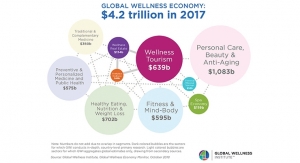11.26.18
Vitamin and mineral supplements may be beneficial for people who aren’t getting the micronutrients they need through their diet, but do not help in preventing chronic disease, according to an updated position paper published by the Academy of Nutrition and Dietetics.
“The dietary intakes of many Americans are inadequate in some micronutrients, so micronutrient supplements can be used to help individuals meet a nutrient requirement or to treat a diagnosed deficiency,” according to the authors. “There was insufficient evidence to determine whether taking multivitamin mineral supplements was beneficial for preventing chronic disease in generally healthy people.”
The Academy’s updated position paper “Micronutrient Supplementation” was published in the November issue of the Journal of the Academy of Nutrition and Dietetics. “It is the position of the Academy of Nutrition and Dietetics that micronutrient supplements are warranted when requirements are not being met through the diet alone. Those with increased requirements secondary to growth, chronic disease, medication use, malabsorption, pregnancy and lactation, and aging may be at particular risk for inadequate dietary intakes. However, the routine and indiscriminate use of micronutrient supplements for the prevention of chronic disease is not recommended, given the lack of available scientific evidence.”
The paper updated the academy’s previous position paper on this topic by focusing on the proper use of micronutrient supplements—a category that contains single or multi-vitamins and minerals. The paper stresses that vitamin and mineral supplements are not beneficial in preventing chronic disease and they have the potential to increase intakes above the Tolerable Upper Intake Levels, therefore increasing the risk of adverse health effects.
The authors noted that registered dietitian nutritionists and nutrition dietetics technicians, registered, under the supervision of an RDN, have the knowledge to help educate the public on healthful dietary patterns and on safe and appropriate selection and use of micronutrient supplements. People who can benefit from micronutrient supplements include pregnant women, breast-fed babies and people with intermediate or advanced age-related macular degeneration.
The updated position paper was authored by registered dietitian nutritionists Melissa Ventura Marra, PhD, and Regan L. Bailey, PhD, MPH.
“The dietary intakes of many Americans are inadequate in some micronutrients, so micronutrient supplements can be used to help individuals meet a nutrient requirement or to treat a diagnosed deficiency,” according to the authors. “There was insufficient evidence to determine whether taking multivitamin mineral supplements was beneficial for preventing chronic disease in generally healthy people.”
The Academy’s updated position paper “Micronutrient Supplementation” was published in the November issue of the Journal of the Academy of Nutrition and Dietetics. “It is the position of the Academy of Nutrition and Dietetics that micronutrient supplements are warranted when requirements are not being met through the diet alone. Those with increased requirements secondary to growth, chronic disease, medication use, malabsorption, pregnancy and lactation, and aging may be at particular risk for inadequate dietary intakes. However, the routine and indiscriminate use of micronutrient supplements for the prevention of chronic disease is not recommended, given the lack of available scientific evidence.”
The paper updated the academy’s previous position paper on this topic by focusing on the proper use of micronutrient supplements—a category that contains single or multi-vitamins and minerals. The paper stresses that vitamin and mineral supplements are not beneficial in preventing chronic disease and they have the potential to increase intakes above the Tolerable Upper Intake Levels, therefore increasing the risk of adverse health effects.
The authors noted that registered dietitian nutritionists and nutrition dietetics technicians, registered, under the supervision of an RDN, have the knowledge to help educate the public on healthful dietary patterns and on safe and appropriate selection and use of micronutrient supplements. People who can benefit from micronutrient supplements include pregnant women, breast-fed babies and people with intermediate or advanced age-related macular degeneration.
The updated position paper was authored by registered dietitian nutritionists Melissa Ventura Marra, PhD, and Regan L. Bailey, PhD, MPH.





















